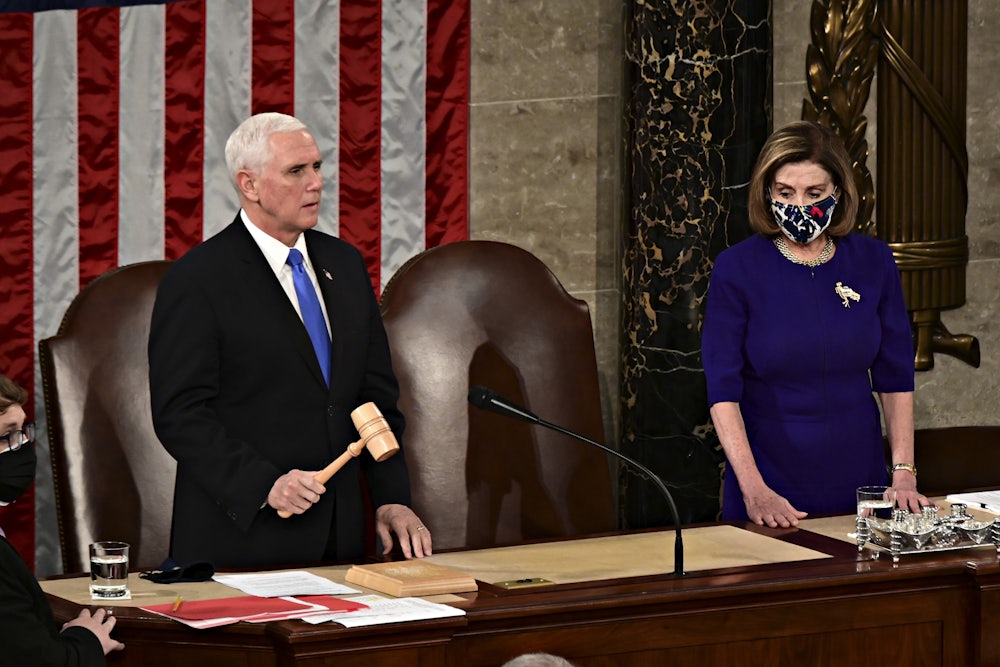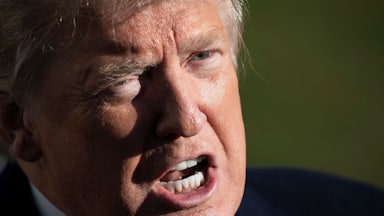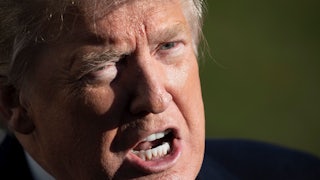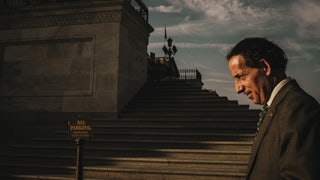Many lawmakers in Congress appear to have made the same new year’s resolution: to rewrite the Electoral Count Act of 1887, or ECA. Democrats have floated reforms to the law that governs the quadrennial task of counting and recording the votes of the Electoral College since last year’s attack on the Capitol, which put the ECA’s workings under a harsh spotlight. More recently, and perhaps surprisingly, a growing number of conservative lawmakers and commentators are calling for reforms, as well.
“Rewriting or repealing the Electoral Count Act leaves neither party with a partisan advantage,” The Wall Street Journal’s editorial board argued last week. “Now is also a good time to pass such legislation, since no one knows who will control each chamber of Congress in 2025.” National Review’s editorial board declared unironically that because Democrats “have a long history of post-election contests and rejecting the legitimacy of their election losses, Republicans should also want rules in place that make it harder for the other party to overturn a future Republican victory.”
Even Senate Minority Leader Mitch McConnell stated last week that the law “obviously has some flaws” and that changes would be “worth discussing.” Whatever the political and legislative dynamics of that discussion would look like, it’s certainly one worth having. No law can entirely prevent a Trump-style plot against the republic, but at the very least, it should not make it easier to accomplish.
What, you might be asking, does the Electoral Count Act of 1887 currently do? As its name implies, the law supplements the Constitution’s provisions on the Electoral College and sets up procedures if there are disputes over a state’s slate of electors. Generally speaking, if at least one senator and one House representative call for a challenge of a particular state’s results during the joint session, the two chambers then vote on whether to accept those results.
The once-obscure law played a pivotal role in the January 6 attack on Congress, which Trump incited during his eleventh-hour efforts to cling onto power last year. Trump had pressured then–Vice President Mike Pence, who presided over the joint session in his role as president of the Senate, to unilaterally throw out state results for Biden and tilt the constitutional outcome in the GOP’s favor. The former president also leaned on loyalist Republican lawmakers to challenge the results in key states. Since Pence and most members of Congress opposed those efforts, and the pro-Trump mob failed to harm any of them, the insurrection ultimately failed.
Part of the problem with the ECA is how it is written—or, to be more blunt, how poorly it is written. “It’s sort of impenetrable,” Edward Foley, an Ohio State University law professor who specializes in election law, told me. “It’s just a dense morass of verbiage that is very hard to understand, which is dangerous because the role that it’s supposed to play is to provide clarity.” He pointed in particular to 3 U.S.C. 15, the 809-word paragraph that tries to spell out the entire counting procedure and barely succeeds at the effort. That lack of clarity invites warped interpretations and bad-faith manipulations of what should be a more staid process.
“At the federal level, we don’t have adequate institutions for this,” Foley told me. If someone at the state level tries to subvert an election outcome, he explained, there are multiple legal and political remedies that can be used between Election Day and January 6 to stop them. A state election official who perpetrated the sort of act of electoral subversion that Trump pressured Georgia Secretary of State Brad Raffensperger to undertake on his behalf in 2020, by throwing out lawfully cast ballots, could be stymied in state and federal courts by, among other things, the Equal Protection Clause principle laid down by the Supreme Court in Bush v. Gore.
Foley was careful not to minimize the risk posed by “rogue governors or rogue secretaries of states” in 2024. At the same time, he stressed that there are more checks on those actors at the moment than there are on members of Congress who want to reverse the outcome of a presidential election. “The concept of the ECA was to bind Congress to the adjudication in the states,” Foley told me. “And, you know, [Missouri Senator Josh] Hawley completely ignored that, [Texas Senator Ted] Cruz completely ignored that, [Alabama Representative] Mo Brooks completely ignored that. So did [California Senator] Barbara Boxer, for that matter, back in 2005.”
The relative obscurity of the ECA used to be a good thing, much as Americans only know about the Emergency Broadcast System from its routine monthly tests. Unfortunately, the United States has not had a presidential election where the results were universally accepted in more than a quarter-century. After Bush v. Gore and the Florida recount debacle of 2000, some House Democrats objected to that state’s electoral votes during the ritual counting, only to be brushed aside by then–Vice President Al Gore, who effectively presided over his own defeat. Democrats objected after the 2004 election, claiming irregularities in Ohio, and again in 2016 as a symbolic protest of Trump’s victory despite losing the popular vote.
None of those efforts by Democrats were serious attempts to reverse the election’s outcome. But they underscored the strange role that Congress can play when overseeing the results of a presidential election. Ironically, the ECA itself is the product of a constitutional crisis. In 1876, Democratic candidate Samuel Tilden and his Republican opponent Rutherford B. Hayes both found themselves without a clear majority of electors after Election Day. In four states where voting had been tainted by election fraud and white-supremacist violence, officials drew up rival slates of electors for each candidate.
With the shadow of violence looming on the horizon, Congress created a special commission to determine the winner, which handed the presidency to Hayes. In exchange for Democrats’ acceptance of the result, Republicans withdrew federal troops from the South and effectively ended Reconstruction. Most histories of the crisis of 1876 end there. But Foley explained that similar problems bubbled beneath the surface of the next two presidential elections, as well. Four years later, in 1880, James Garfield defeated Winifried Hancock by just a few thousand votes across the country, with some Democrats suspecting that fraud in New York tipped the results.
By 1887, Congress finally drafted the ECA as a compromise. “The people who lived through the experience of 1880 and 1884, having also lived through 1876, said, ‘We cannot have another election where we don’t have a set of agreed-upon procedures, as best as we can come up with, to handle the possibility of another situation like this,’” Foley told me. “And indeed, it was another very close election but not close enough to tailspin into 1876-like controversy.” As anyone who’s done a group project can sympathize with, the law’s sloppy drafting reflects its own complicated and consensus-driven origins.
Despite the insurrection, Republicans have good reasons to want to reform the law, as well. For one, they aren’t the party that’s shown the greatest willingness to invoke the ECA over the last few decades. The Cato Institute’s Andy Craig warned conservatives last month that Democrats could theoretically use it to exclude Trump from the presidency, even if he wins the most electors in 2024, by citing the Fourteenth Amendment’s ban on public office for those who participate in insurrections. In the long term, Craig noted, Democrats could also use it as a backdoor mechanism to hand the presidency to whoever wins the popular vote, rendering the Electoral College superfluous without the trouble of amending the Constitution.
For Democrats, the good-governance justifications for rewriting the ECA are obvious. A party that claims to champion the American democratic process cannot reasonably stomach a law that allows it to be subverted by the whims of a few hundred members of Congress. Though it was written with something resembling good intentions, a law designed to prevent the instability of disputed elections has instead become a key factor in that instability itself. Congressional Democrats have no shortage of good ideas for election reform and improving our democracy. Few, if any, are as urgent as this one.










